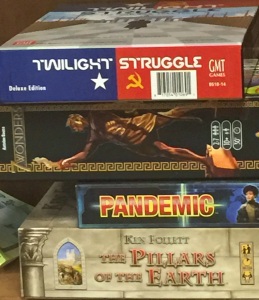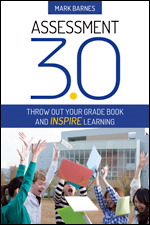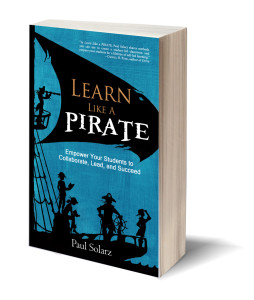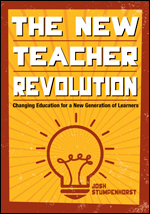Okay, so I got a little behind on my reflecting. What did you expect? I’m a teacher. Are you going to dock your students points because they’re a few days late. Let me tell you a lot of things got in the way of typing this post. I started one day and got interrupted necessitating a shut down of my browser where I was typing directly into WordPress. With the browser shut down it disappeared because I didn’t SAVE DRAFT! But, enough with the excuses and back to #reflectiveteacher 30 days blogging challenge. Don’t worry, I’ll get all thirty days in……somehow 😉
Day 4
What do you love the most about teaching? I love the students the most.
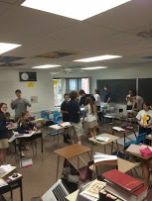
My Classroom 411
Content was what drew me to teaching, but the students are what keep me coming back. My students are like my own kids. I get to help 100+ kids a day become more successful learners. The excitement, the joy, the naivete that kids bring to class is so awesome that I would pay to be able to have these types of interactions and relationships (I kind of do pay in many ways because of tighter budgets).
I also love the gathering of people in one building to learn. I like online learning, but nothing beats the face to face gathering of people and the exchange of ideas that teaching brings.
Day 5
Post a picture of your classroom, and describe what you see–and what you don’t see that you’d like to.

My Empty Classroom
This photo of my classroom shows me rows of desks, put that way to maximize the number of student bodies that can fit into the room. I see lots of bare space on the walls and technology that is outdated or doesn’t work. I see a mix of student desk types and I see lots of books.
What I don’t see is comfortable furniture that is more conducive to student collaboration and relaxation. I don’t see this as a fun room to come into. I see work that needs to be done and idea paint that needs to go on the walls. I don’t see work spaces that allow for small groups to focus together. And I don’t see how this arrangement is much different than 100 years ago.
I want this space to be a student created space or at least a space that students would look forward to walking into. A space where they feel comfortable and at home.
Below is a picture of my plan for the space.
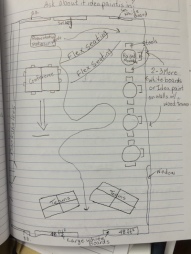
My vision for my classroom. Please feel free to donate 😉
Day 6
What does a good mentor “do”? A good mentor coaches, listens, and offers advice. A good mentor is always looking for ways to improve their craft just like I am always looking. A good mentor is a connected educator who has experience and is up to date on the current research. A good mentor is an encourager who encourages others to take risks and to think outside the box. A good mentor is there for you.
Day 7
Who was or is your most inspirational colleague, and why? Shaelynn Farnsworth and Leslie Pralle Keehn, both from Iowa, are my most inspirational colleagues. These two people are in the realm of Super Heroes. They are teachers who are not afraid to take risks, they will push back the status quo, and they lead people to greatness. Shaelynn and Leslie help me become a better version of me and they’re not afraid to offer constructive criticism (which I really need at times). They present their ideas to others and they are awesome creative thinkers.
Day 8
What’s in your desk drawer, and what can you infer from those contents? There are lots of dice in my desk drawer. Dice, supplies, and dice. I would say that inferring much from what’s in my desk drawers would be dicey at best. I like to take risks and sometimes you just have to roll the dice and leave it up to God.
Day 9
Write about one of your biggest accomplishments in your teaching that no one knows about (or may not care). One of my students with a learning disability (memorizing) made it to the state National History Day contest by doing a 10 minute performance on the Salem Witch Trials. I was super proud of her. Probably the biggest accomplishment in my teaching is that I have adapted to all the changes and challenges that technology has brought to education.
Day 10
Share five random facts about yourself.
1. I love being at school at 6 am (2 hours early).
2. I have four children.
3. I love that my kids enjoy Minecraft.
4. I am a gadget geek.
5. I love teaching in a Catholic school.
Share four things from your bucket list.
1. I want to travel Europe for an entire summer.
2. I want to visit Sue Waters in Perth Australia.
3. I want to tour New Zealand.
4. I would like to meet Pope Francis.
5. I want to win the ISTE teacher of the year award.
Share three things that you hope for this year, as a “person” or an educator.
1. I hope that my Via de Christo class makes a connection with another country to help others in need.
2. I hope to become a well-planned teacher.
3. I hope that I can keep my kids interested in the Bible.
Share two things that have made you laugh or cry as an educator.
One thing that made me laugh and cry was finding out that my new school and classroom did not have air conditioning. I cried when I found out that many people in education are still teaching the same way as teachers did over 100 years ago.
Share one thing you wish more people knew about you.
I wish people knew that I want what is best for kids and standardized testing be d***ed. I could care less about what a kids percentile rank is as long as that kid is creative, can collaborate, can communicate effectively, and think critically as well as problem solve and knows how to learn independently.
Day 11
What is your favorite part of the school day and why?
My favorite part of the school day is watching the students in the hall between classes. I enjoy interacting with the students without the pressure of having to pass along content to them. The kids are more like kids when they are interacting in the hallways.
Day 12
How do you envision your teaching changing over the next five years?
My hope is that teachers will rise up and overthrow the testing companies nooses and take back education from governmental control. Education should not be a political bailiwick. I hope that we shift focus to what Dr. Tony Wagner call the 7 Survival Skills and move toward personalized learning for all students. My constant hope is that I don’t fall into the trap of WADITW (We’ve always done it this way) and that I can keep up with the research on best practices. I see my teaching becoming focused more on what individual students know and can do versus what’s best for the group as a whole.
Whew, I hope I can keep up to date and make these posts more frequent. I’m hoping every two to three days. Keep chasing your dreams 😎


